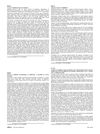 53 citations,
April 2021 in “Cell Host & Microbe”
53 citations,
April 2021 in “Cell Host & Microbe” Skin bacteria, specifically Staphylococcus aureus, help in wound healing and hair growth by using IL-1β signaling. Using antibiotics on skin wounds can slow down this natural healing process.
 48 citations,
February 2017 in “Journal of Cosmetic Dermatology”
48 citations,
February 2017 in “Journal of Cosmetic Dermatology” The conclusion is to use scalp cooling, gentle hair care, and treatments like minoxidil for managing hair loss from chemotherapy, and stresses the need for more research and collaboration in this area.
 48 citations,
May 1999 in “International Journal of Dermatology”
48 citations,
May 1999 in “International Journal of Dermatology” Alopecia areata is an unpredictable autoimmune hair loss condition, treated based on severity, with half of patients regrowing hair within a year without treatment.
 37 citations,
May 2016 in “JAAD case reports”
37 citations,
May 2016 in “JAAD case reports” Oral minoxidil shows promise in treating monilethrix-related hair loss.
 26 citations,
June 2018 in “Australasian Journal of Dermatology”
26 citations,
June 2018 in “Australasian Journal of Dermatology” Stopping sunscreen use on the forehead led to hair regrowth in a woman with frontal fibrosing alopecia.
 25 citations,
July 2021 in “Journal of Medical Virology”
25 citations,
July 2021 in “Journal of Medical Virology” COVID-19 can cause various skin issues, including rashes and hair loss, which usually heal on their own and don't always indicate severe illness.
 18 citations,
May 2020 in “Biomolecules”
18 citations,
May 2020 in “Biomolecules” Spironolactone, a heart and liver drug, has new uses including cancer treatment, viral infection prevention, and skin condition improvement.
 16 citations,
August 2014 in “Archives of Pharmacal Research”
16 citations,
August 2014 in “Archives of Pharmacal Research” Special nanoparticles increased skin absorption of hair loss treatments with fewer side effects.
15 citations,
July 1993 in “The journal of investigative dermatology/Journal of investigative dermatology” Retinoids can change the hair growth cycle by extending the growth phase and shortening the rest phase.
 4 citations,
December 2021 in “Experimental and Therapeutic Medicine”
4 citations,
December 2021 in “Experimental and Therapeutic Medicine” Adult female acne is complex and requires a combination of treatments for effective management.
 2 citations,
January 2018 in “Elsevier eBooks”
2 citations,
January 2018 in “Elsevier eBooks” Targeted therapies for lung cancer are effective but require careful management of side effects to benefit patients.
 2 citations,
April 2016 in “Journal of Mind and Medical Sciences”
2 citations,
April 2016 in “Journal of Mind and Medical Sciences” Finasteride, used for treating hair loss, can cause mental, physical, and sexual side effects, some of which may persist even after stopping the drug, and it can also cause mild to moderate oral issues.
 1 citations,
May 2021 in “Revista Eletrônica Acervo Científico”
1 citations,
May 2021 in “Revista Eletrônica Acervo Científico” The document concludes that more research is needed on treatments for hair loss in both men and women, especially on medication combinations and their benefits.
 1 citations,
January 2015 in “Springer eBooks”
1 citations,
January 2015 in “Springer eBooks” The document says a skin condition called alopecia areata causes hair loss and stress, and is treated with strong skin creams, injections, or other therapies, but treatment success varies.
 April 2024 in “Expert opinion on investigational drugs”
April 2024 in “Expert opinion on investigational drugs” JAK inhibitors are safe and effective for treating moderate-to-severe alopecia areata.
 April 2022 in “Medicina estética”
April 2022 in “Medicina estética” Minoxidil is the only FDA-approved treatment for female hair loss, with other potential treatments needing more research for effectiveness.
 October 2021 in “Cosmoderma”
October 2021 in “Cosmoderma” Hair loss can be managed with treatments like minoxidil, finasteride, and others, but there are still gaps in effectiveness and off-label usage is increasing.
 March 2014 in “Journal of the American Academy of Dermatology”
March 2014 in “Journal of the American Academy of Dermatology” Alopecia areata is relatively common in children, has a variable course, and shows different responses to treatment; thyroid testing is recommended for those affected.
 January 1991 in “Journal of Pediatric Health Care”
January 1991 in “Journal of Pediatric Health Care” Hair loss in children can be caused by fungal infections, trauma, autoimmune disorders, or stress, and treatments vary depending on the cause.
 November 2021 in “Elsevier eBooks”
November 2021 in “Elsevier eBooks” Antiandrogens are used to manage polycystic ovary syndrome by reducing androgen levels or controlling their effects, often combined with lifestyle changes and other treatments.
 25 citations,
July 2016 in “The journal of investigative dermatology/Journal of investigative dermatology”
25 citations,
July 2016 in “The journal of investigative dermatology/Journal of investigative dermatology” Imiquimod cream activates hair follicle stem cells and causes early hair growth by changing immune cells and certain protein expressions.
 April 2024 in “Expert opinion on emerging drugs”
April 2024 in “Expert opinion on emerging drugs” New treatments for male hair loss are being explored to improve effectiveness and reduce side effects.
 40 citations,
September 2003 in “Archives of Dermatology”
40 citations,
September 2003 in “Archives of Dermatology” Finasteride slightly better long-term, minoxidil faster initial results, but stopping minoxidil may cause hair loss.
27 citations,
June 2017 in “Expert opinion on investigational drugs” New anti-acne medications are being tested to offer alternatives to current treatments.
 1 citations,
November 2011 in “Archives of Dermatology”
1 citations,
November 2011 in “Archives of Dermatology” A woman's hair loss was caused by her husband's testosterone gel and a diabetic man's nail disease led to bone infection, both treated successfully.

Ingesting minoxidil can cause serious heart problems and requires urgent medical treatment.

Tiny particles called extracellular vesicles show potential for improving skin health in cosmetics, but more research is needed to confirm their safety and effectiveness.
 July 1975 in “Archives of Dermatology”
July 1975 in “Archives of Dermatology” The document suggests a possible connection between rapid weight loss and hair loss, and reports a case of skin condition improvement after stopping acne medication.
March 2023 in “Aktualʹnì pitannâ farmacevtičnoï ì medičnoï nauki ta praktiki” Both new minoxidil formulations significantly stimulated hair growth and improved dermal metabolism.
 5 citations,
December 2015 in “Dermatologic Therapy”
5 citations,
December 2015 in “Dermatologic Therapy” Using a certain drug on the skin can help prevent hair loss caused by pulling on the hair.


























